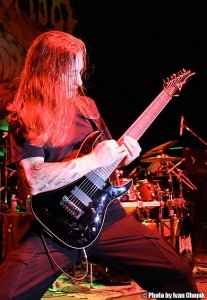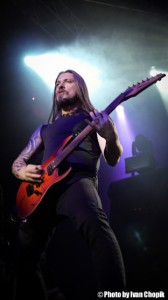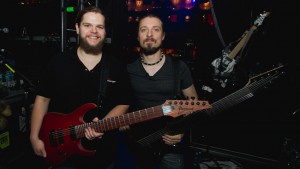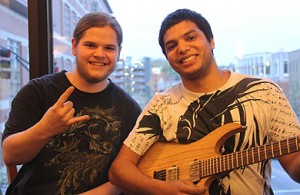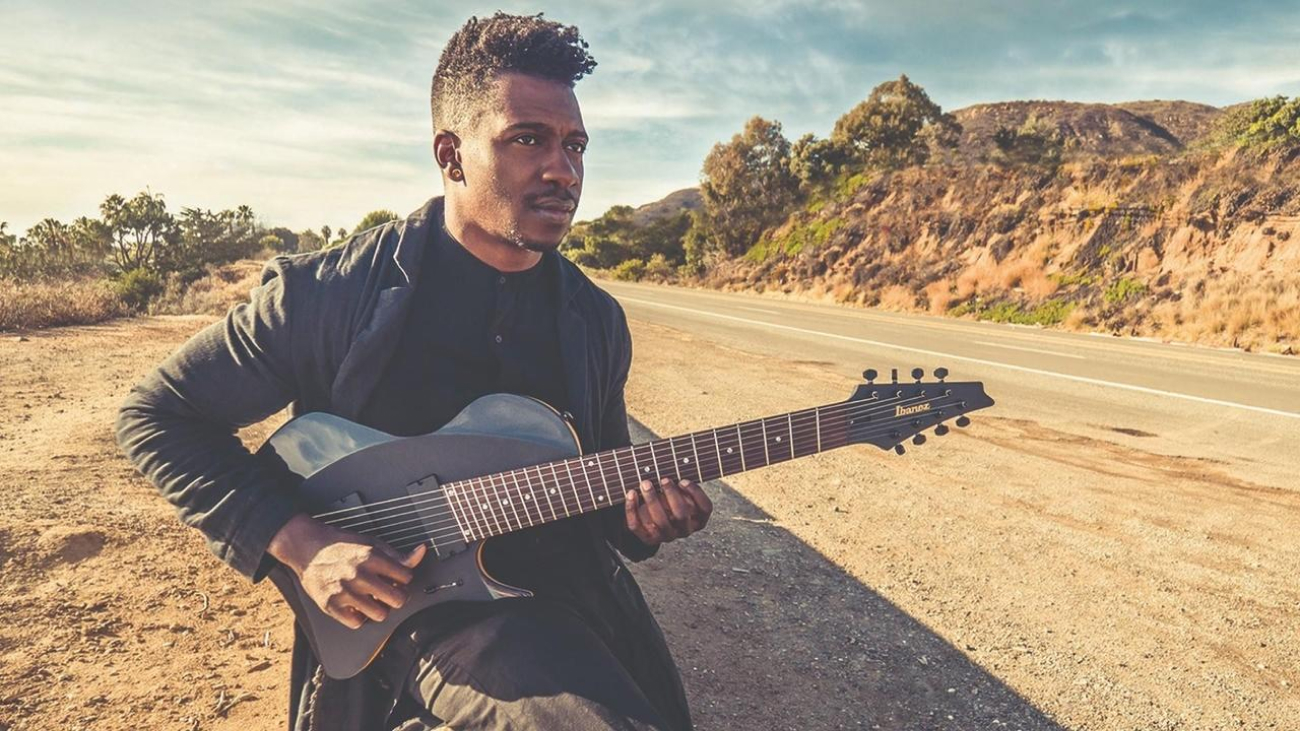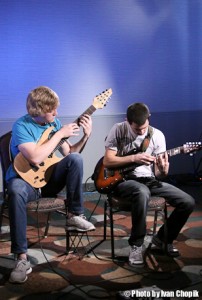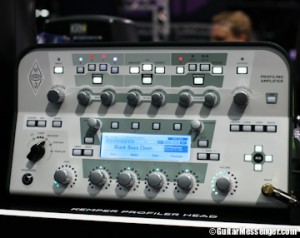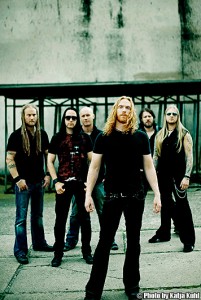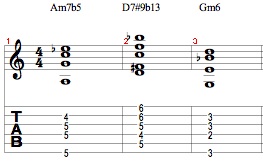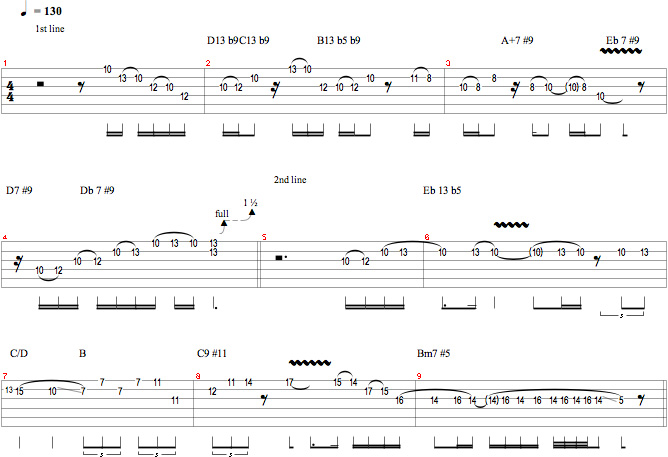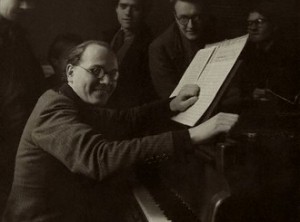Hiss of Atrocities have established themselves as a band capable of delivering a brutal onslaught of complex rhythms, dark harmonies, and calculated aggression. Their particular brand of metal takes the listener on a journey from eerie interludes and relentless riffs to articulate and harmonically rich guitar work, provided by the band’s two axe-men – Roy Lev-Ari and Guitar Messenger’s very own Francesco Artusato (Check out Francesco’s Technical Difficulties column).
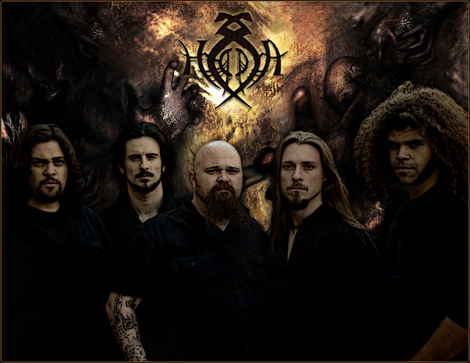
Hiss of Atrocities
The idea for Hiss of Atrocities was conceived in 2005, while Roy, Francesco, and drummer Giovanni Dürst were studying at Berklee College of Music in Boston, MA. Since then the band has relocated to Los Angeles, CA and continued to develop their fan base through live performances and the release of their first full-length record, Rituals of the Lost.
IC: What’s going on with Hiss of Atrocities right now?
FA: We’re going to be on tour – it’s gonna be the first leg. It’s probably gonna be four or five weeks. Then either there’s gonna be a small break, or we’re just gonna keep going, depending on one specific festival that we might play or we might not.
Then we’re gonna keep going for the whole summer, then probably an October/November tour. The more we do, the more is going to be booked, and then we’re going to be on the road all the time. We’re going to rehearse and practice more, and try to have everything ready for the tour.
IC: Congratulations on the release of Rituals Of The Lost. What was the writing process like for the album?
RL: Some of the songs are songs that we had from the beginning that we kept and rearranged, and all of the new songs we wrote here in Los Angeles. Some of the songs took a really long time to write, actually – it took about three months just to write “Rituals Of Sufferance.”
FA: There’s a reason for that. It’s a long song, it’s really complex – there’s a lot of different parts. Roy and I wrote it together, so we kept rewriting that song over and over, changing parts – that’s why it took us so long.
RL: In the end, we were really happy with what we did. It was a difficult album to produce, to put together, and I think we did a really good job.
IC: Where did you record the album and what was that process like?
FA: First, we recorded drums here in LA in two different studios – one was Mad Dog Studios. After that, we started recording guitars in our studio. We didn’t have a bass player, so after we recorded all the guitars, Roy and I recorded the bass, too – so the bass that you hear is us. The vocals were also recorded in our studio, as well as all of the instrumental parts that you hear – intros and outros.
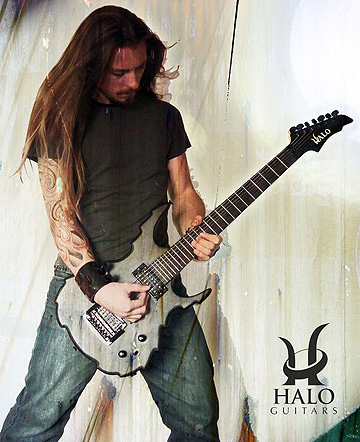
Francesco Artusato
Then after that, we just sent the tracks to Jeremy Krull in New York, and he mixed the whole thing and mastered it. The way we had recorded the guitars was directly into our M-Audio interface, so it had a completely clean sound, and what Jeremy did was to re-amp the guitars. What you hear on the album is a modified Marshall, and he was also using overdrive pedals and different kinds of pedals, so the sound is customized.
IC: How did you guys get in touch with Jeremy and how did he get involved with the project?
FA: Since our beginning in Boston, we were always working with Jeremy – he produced, recorded, mixed, and mastered our first two demos. Right before we moved to LA, we were about to finish a third demo with him, but we decided to just keep those songs for the album. He also played a couple of gigs with us when we needed a bass player in Boston. He’s really talented and we like what he does. He’s a friend, I trust him completely, and he’s easy to work with – all of the good elements.
IC: I understand both of you guys play the solos on Rituals Of The Lost. How do you approach solo sections?
RL: It’s really spontaneous when we decide where to play the solos and how we do the solos. When we write a song, we decide at the beginning ‘We’re gonna have two solos, and the solos are gonna be in this specific section.’
Usually I come up with my own solos and Francesco comes up with his own solos and we put them together and make them fit. We usually talk about it a lot in the rehearsal space, and the end result is that we collaborate.
IC: Tracking back to the beginning of the band – it started with Roy and Giovanni. Francesco, how did you come into the equation and how did you all decide to become a band?
FA: First Roy and Giovanni started jamming before I joined the band. I met Roy the first week at Berklee, and then we started talking. We talked for a long time about playing music together, and then after that I met Giovanni. Before summer break they told me that they were thinking of having me in the band, so after the summer we started. Probably 99% of the people at Berklee are looking for the musicians that they’re probably going to play with for the rest of their life, or they hope to, and that’s what I was looking for and what they were looking for, too.
RL: When we first met, we were talking about what we liked and the bands that inspired us to play, and it was Opeth and Meshuggah for both of us. So it was good to meet Francesco, because with Francesco and Giovanni we started this triangle, and we just stuck together, and we’re keeping it going as long as we can.
IC: So both of you graduated from Berklee, correct?
FA: Actually, four people out of five in the band graduated from Berklee.
IC: So out of you two, I believe Francesco majored in Film Scoring and Roy majored in Guitar Performance. Why did you pick Film Scoring, Francesco? It seems like Performance would have been the more direct path to your goals.
FA: Yeah, in the beginning I thought I was gonna just do Performance, because I thought my only interest was in just playing guitar. Now, it’s most of what I do, but I always loved classical music, and I was really into composition. For me, it was a balance between composing music and thinking in a wider range – not focusing only on the guitar, and thinking in a more orchestrated environment.
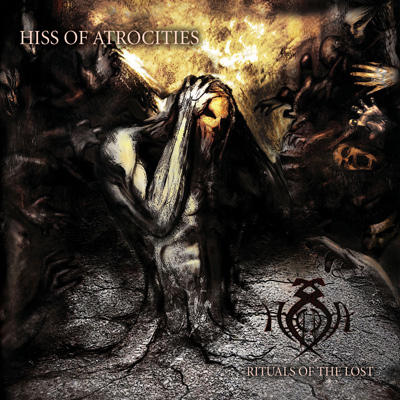
Rituals of the Lost
I think that helped me a lot, and the way I see music is definitely different from the way I see guitar. I think it’s mainly that passion for classical music. I was actually thinking of just studying composition, but I also wanted to do something that would give me some work after school.
IC: So do you find yourself utilizing that now, or is performing the main gig for both of you?
RL: Performance is the biggest goal, at least for me.
FA: Yeah, I feel the same way. We moved here a little more than two years ago, and the first year we all did different things, because the band was not moving in the same way it’s moving now. Now it’s probably our full-time job. We have so many things to do, and it’s important that we all focus on it. Right now we’re all really excited, and we can’t wait to tour and do this.
IC: You guys were making some serious progress in the Massachusetts area where you were originally based – playing some of the biggest venues around, opening up for bands like Shadows Fall and Diecast, and playing at the Palladium in Worcester [The premier metal venue in the Massachusetts area]. What motivated you to move to LA, when you seemed to be doing well in Massachusetts?
FA: Probably you’re going to get two different answers. I’d say that Giovanni and I were attracted by LA – we thought it was gonna be different. There was nothing wrong with the way the Boston scene was, but in LA there are so many clubs, and even though metal is not the main music, it’s still a pretty big thing. There a lot of bands, and there are contacts to make. I think after all of two and more years, we realized how tough it was – especially in the beginning. I’m happy with it now, though.
RL: Yeah, also being an international student, it was more important after we graduated from a music school that we came into a city in which music as a business thrives the most. In that aspect, it was a good idea to come to LA. We had problems here in the beginning, because we had lineup problems, and that screwed things up.
IC: Finding a metal vocalist isn’t easy anywhere. How did you go about rounding out the lineup once you got to LA?
RL: That was a two-year process of looking for people on the Internet, auditioning lots of people – finding people that would suit our style, psychologically and musically. Now I think we’ve found two really good members that we hope can stay in the band for a really long time.
IC: How do you find the metal scene to be different in LA as compared to Boston?
RL: The difference between the metal scene here and in Boston is that here there’s more of a scene. Here a lot of bands take their craft really seriously. There are more professional bands that are striving to get signed, and there’s a lot of clubs that play metal. I think Boston was a bit of a smaller scene, and there’s not as many bands. So I think in the whole Massachusetts area there’s a lot of metal bands, it’s just a difference between the two cities.
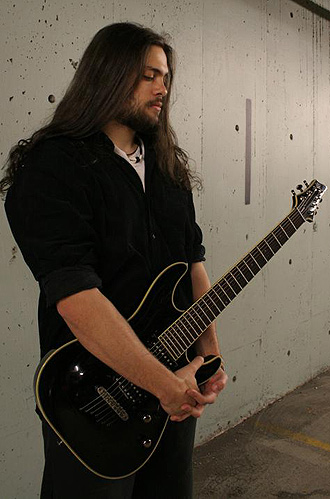
Roy Lev-Ari
IC: Roy, you were born in Kenya and lived there until you were 20 before attending Berklee. How did you get into playing guitar over there?
RL: It started as a social thing. In the group I used to hang out with, one guy started playing guitar so it became the cool thing to do, so we all started playing guitar – ‘Enter Sandman’ and ‘Come As You Are’ and those sorts of things. I liked it a lot and I started to take it really seriously.
IC: What kind of music do people listen to over there? Is there much metal?
RL: Well, I think that the metal scene that is in Kenya right now is limited, but there is one that me and a whole bunch of kids started a long time ago. Right now there is a scene there – you have a lot of Kenyan people that go to shows, but Kenyan music leans more to traditional music, hip-hop, r&b – metal is not very present. I’d say no, it’s not a good place for metal.
IC: What motivated you to come to Berklee?
RL: After I graduated from high school, I talked about it with my parents to see what my options were in music. Because I was doing so much music in high school, like being part of the band and the theater club and being part of bands, it’s what I wanted to do and Berklee seemed like the best option.
IC: Francesco, how about you? How did you get started with guitar?
FA: I’ve always been into music a lot, because my entire family was really into music. I was going to concerts since I was a kid – classical music, pop rock, all kinds of stuff. My cousin’s actually a jazz player and is pretty well known in the area, and my brother plays guitar, piano, and sings.
So I’ve just been around a lot of music, and at 14 I started playing saxophone. I played for a few years, and I never felt like it was the right way to express what I had to express musically. My dad had so many guitars at home, and at one point I said ‘Okay, I’ll start playing one.’ I don’t know why it took me so long to start playing guitar, because I started playing guitar at 18, but I think after an hour, I was already thinking that it was going to be the thing I was going to do for the rest of my life.
IC: How did you hear about Berklee and end up moving to the US from Italy?
FA: One of my best friends, Paul, is a bass player, and he knew about this school. When I told him ‘This is the only thing I want to do, and I’m worried because I have to keep studying and the only thing I want to study is music.’ He said ‘Why don’t you go to a music school that’s really famous in the US?’ This was about a week after I started playing guitar, so I started talking with my parents about going to Boston, and of course at the beginning they thought I was making a joke, but then they saw that I was serious and that it was the right thing to do.
IC: You just released an instrumental EP called Gardens Of Yama. How did you approach songwriting for that project and how does it differ from your work in Hiss Of Atrocities?
FA: Two years ago, I started writing instrumental songs – enough material for a full album. I recorded four songs and then I got so busy with other things, that I didn’t record anything else. It developed out of me wanting to do more melodies and solos, because I love it. I don’t love when it’s overdone, but I like to keep it balanced. So I wanted to do something like that, too. It’s still metal, but you don’t have a singer so you can be the main voice. I found it challenging, too – it’s hard to find fresh ideas. So I had a lot of fun experimenting with new licks and new lines.
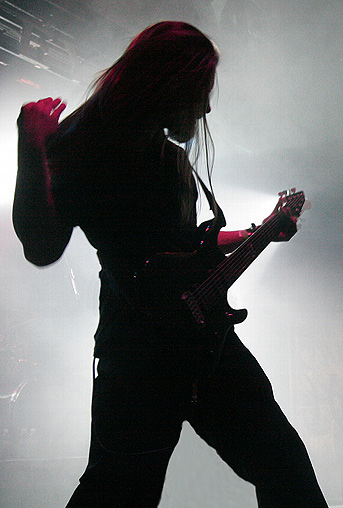
IC: You also played first guitar in Vuk Kulenovic’s Electric Symphony recently. How did you get involved with that project?
FA: In my second semester at Berklee, I met Kulenovic and since then I’ve just thought he was an amazing person and composer. I had him as a teacher for three years while I was at Berklee. He became a friend, so now we just talk on the phone to talk. While I was at Berklee, he started this project that was called Electric Symphony, and he said ‘I always wrote concert music for mostly traditional instruments, and now I’m at Berklee and I have a chance to work with different kinds of musicians.’
So he started this idea of having instruments like the electric guitar, electric bass and drums in a classical piece. In the beginning, he told me he didn’t have much experience with the electric guitar, so he would write music in notation and bring it over, and we would look at it together. I would try to play it and give him feedback on the playability of it.
We did that for the whole first movement, and then I moved to LA and when they finally decided to schedule the world premiere, he called me and said ‘I’d love for you to be one of the guitar players.’ And the first guitar part had the most challenging parts, so I had to pick that. It was an amazing experience, I got to play with a lot of great musicians and ultimately, it was challenging.
IC: Let’s talk about your gear a little bit. What do you use in your live rig?
FA: We both use Peaveys, and the bass player actually just bought a new Peavey amp – we’ve got an endorsement deal with Peavey now, so they’re easier to buy. Even before that, I always thought that Peavey was the right sound for what we’re playing. In my experience, it’s always best to play an amp that comes through in any size of venue. It’s a simple and effective amp, and really the right thing for us right now.
I also use TC Electronic for effects, I have a Voodoo Lab Ground Control on the floor with a volume pedal that I use as a volume and expression pedal, and I use a Line 6 X2 Wireless System. The main guitar I play is a seven-string that was custom-made for me – it’s a really amazing guitar. I’ve had it for about eight years, and I’m still playing it most of the time. Then I also have an endorsement with Halo Guitars, so I play their seven-string, and a Schecter, as well. For the second album, which we’ve started writing, I’m going to play a six-string tuned down.
IC: Still In B Standard?
FA: Yeah.
IC: What motivated you to change that up?
FA: Mainly the way Roy tunes his seven-string.
RL: I usually tune the G down to F#/Gb, and that allows me to look at the seven-string as a six-string with an added high E rather than an added low B. So it acts as a visual aid, and it allows me to use more open strings in the key of B.
FA: So many times I end up playing riffs that need the open Gb. The other reason for the change is that a six-string is more comfortable than a seven-string, so it’s good for my hands since I’m playing a lot. Especially when we’re going to be on tour playing every night, it’s better to rest my hands a bit. Also, many manufacturers are stopping production of seven-string models and six-strings are easier to find in more varieties.
IC: Do you use any overdrive pedals or boosters?
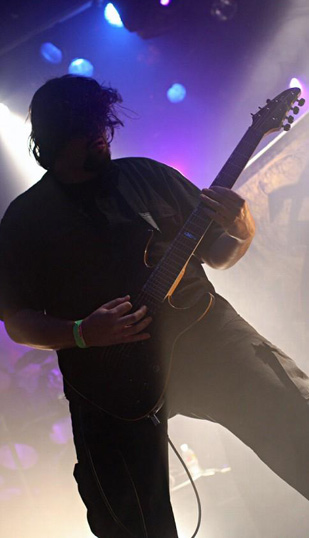
FA: No, I don’t. My distortion is straight from the amp. The amp has two channels, and when I’m playing rhythm I’m using the same amount of distortion as when I’m playing lead, but when I play lead I add a little bit of compression. That way I have more sustain, and it’s a little easier to play. I tend to put the overdrive around six and a half or seven. I don’t want too much distortion, because when you get too much distortion all the riffs get muddy. Since we play low notes on seven-strings during fast lines, it could get very confusing with a muddy tone.
IC: Roy, can you tell us about your rig?
RL: Francesco and I use mostly the same gear, but I filter it through a Line 6. I have one clean tone, a solo boost, and rhythm distortion – I like to keep it simple. I like Schecters, and as I said I retune the G. I would love to not need a pedalboard, to be able to play just into the amplifier.
IC: What band would you two most like to tour with?
FA: Opeth. I’m not even sure I like it anymore, but I’d also like to tour with Dream Theater. They’re one of the reasons why I started playing guitar, so even though I barely listen to them anymore, I’d love to tour with them one day. I’d like to tour with Meshuggah, too.
RL: For me, Opeth is definitely number one. It would be amazing to tour with Opeth – they’re our biggest influence and they’re my favorite band.
IC: What are you guys listening to these days in your off time?
RL: The new Mastodon album is what I’ve been listening to the most. I really got back into Soulfly a few days ago – it’s been a long time since I liked music that was simpler but really based on the groove part of it.
FA: Definitely the new Mastodon album, Crack The Skye, is a really amazing album. I’ve been listening to that a lot. I love Gojira – I’ve been listening to their last album. I listen to a lot of classical music, especially 20th century classical.
IC: Which composers are you mainly listening to?
FA: Mostly Penderecki. A couple months a go I bought a couple scores, and I’ve been studying some of them, including the first Violin Concerto. I actually transcribed the final cadenza and recorded it for my MySpace page. It’s the craziest thing I’ve ever played. Besides that, I’m studying it from a composition point of a view, because it’s so amazing and so complex. I can’t even imagine what it would be like to write music so complex.
IC: What are your goals and where do you see Hiss Of Atrocities in five years?
RL: The goal is to become a successful touring band, and be able to live off of that. That’s what we’re working for. Five years is a long time, so I hope that by then we’ll be in quotes, ‘living the dream.’
IC: What about you, Francesco?
FA: Right now it’s all about that. That’s the only thing I can think of.



